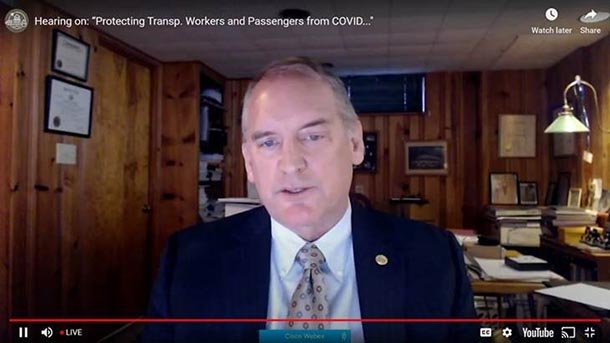
William P. Bahnfleth, professor of architectural engineering at Penn State, spoke via video call to the U.S. House Committee on Transportation and Infrastructure about a layered approach to protect passengers and workers during the COVID-19 pandemic on Feb. 4. IMAGE: WILLIAM BAHNFLETH/PENN STATE
Engineer testifies on COVID-19 mitigation before congressional committee
William P. Bahnfleth, professor of architectural engineering, spoke on gaps in COVID-19 safety for transportation workers and passengers
2/15/2021
By Ashley J. WennersHerron
UNIVERSITY PARK, Pa. — William P. Bahnfleth, professor of architectural engineering at Penn State, testified as an expert witness during the U.S. House Committee on Transportation and Infrastructure’s hearing, “Protecting Transportation Workers and Passengers from COVID: Gaps in Safety, Lessons Learned, and Next Steps,” on Feb. 4.
“COVID continues to take a terrible toll, so it is more important than ever to understand the tools available to us to reduce risk of disease transmission in aircraft, ships, trains and buses, as well as the stationary facilities that support transportation,” Bahnfleth said. “The easiest way to avoid becoming infected while traveling is to not travel in the first place, but that’s not possible for many essential workers and people who have critical needs, such as doctor appointments.”
As chair of the ASHRAE (previously known as the American Society of Heating, Refrigerating and Air-Conditioning Engineers) Epidemic Task Force, Bahnfleth leads a group of volunteer members with expertise in air conditioning, ventilation, filtration and air cleaning to make recommendations concerning virus mitigation in buildings and during travel. So far, the task force has produced hundreds of pages of guidance materials and more than 100 instructional courses focused on how to mitigate airborne infection risk as part of a layered infection control strategy that addresses other modes of transmission such as surface contamination. The mitigation efforts highlight “engineering controls” associated with heating, ventilating and air-conditioning (HVAC) systems, including using outdoor air to dilute indoor air, exhausting indoor air, controlling air flow and filtering and cleaning indoor air.
“This guidance is based on current understanding of how COVID-19 is transmitted and on the principles of infection controls applicable to indoor environments generally, which includes mobile environments such as cars, trains, buses, aircraft and ships,” Bahnfleth said.
Understanding mitigation controls and implementing them are quite different, according to Bahnfleth, especially when federal and local policies conflict with industry or individual interests. For example, an airline company may not require physical distancing among passengers if it means selling fewer tickets, or a bus driver may not be willing to confront an irate passenger not wearing a mask. The complexity deepens when considering the financial burden of implementing upgraded mitigation systems, especially if such upgrades would require halting services — a potential hardship for both employees and service users.
“As a representative of a technical society, it’s not really my place to say how things should get done, but I do believe that our standards should continue to improve,” Bahnfleth said. “I believe in standards produced by census bodies being widely adopted.”
The call for improved standards was echoed by the five other expert witnesses: David Michaels, a professor of public health at The George Washington University; Sara Nelson, the international president for the Association of Flight Attendants; Lewie Pugh, executive vice president of Owner-Operator Independent Drivers Association; Ismael Rivera, a bus operator for Lynx in Florida; and Joe Buscaino, a councilman in Los Angeles.
“This lesson — that risk can be significant and that our transportation systems currently may not provide the desired level of protection to workers and passengers — should be reflected in the design of future trains, buses, automobiles and ships,” Bahnfleth said. “We have to keep working toward making travel as safe as possible, in every way possible. Protecting transportation workers and passengers is vital, especially for essential workers and those with critical needs such as doctor appointments. I hope my perspective focused on the built environment and HVAC systems proves useful.”
The committee will consider the expert testimonies as it conducts oversight of federal transportation agencies and departments, as well as develops legislation to address gaps in transportation safety. As the committee reviews innovative technical approaches and the development of national standards, Bahnfleth will provide technical assistance and professional counsel.
Bahnfleth’s full written testimony is available here.



